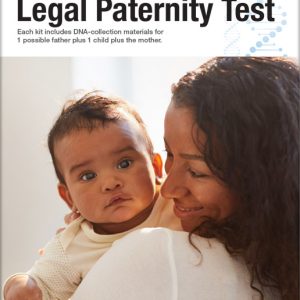
If you may have fathered a child and are considering a paternity test, there are many benefits to doing so, both for the child and you. Besides the emotional benefits, there may be some financial ones as well: namely, you may be able to claim the child on your taxes. Here is a quick overview of three possibilities.
This article is for informational purposes only. Please contact a tax professional in your area who can best advise you on your particular situation or visit the IRS website for complete details.
1. You Can Claim a Child as a Dependent on your Taxes
According to the Internal Revenue Service (IRS), a dependent is a child or other relative for whom you can claim a tax exemption.
What is a tax exemption?
An exemption is similar to a taxable-income deduction, but in this case the amount is subtracted from your adjusted gross income before the taxable income calculation.
SO WHAT’S THE BENEFIT? In a “real life” scenario, when you have a dependent, it decreases the amount of federal taxes withheld in your paycheck by your employer.
There are six (6) specific qualifications that must be considered in order for a child to be claimed as a dependent. The IRS term for the dependent is a Qualifying Child.
- Relationship: The child must be your daughter, son, or other qualifying relative.
- Age requirements: The child must have been under the age of 19 on the last day of the year as well as younger than you. They can also be a full-time student under the age of 24 who is younger than you or a qualifying relative of any age who is permanently disabled.
- You provide more than half of the child’s support: This includes housing, transportation, medical costs, clothing, recreation, and food.
- Where the child lives: If the child has lived with you for more than half of the year, this fulfills the residency requirement.
- Joint return: If the child is married and is filing a joint tax return with their spouse, this disqualifies them from exemption qualification.
- Cannot be claimed as a Qualifying Child by more than one person: If they can be claimed by someone else (for example, the mother’s child to whom you are not married), then you must be the person entitled to claim the child.
2. You May Qualify for a Child Tax Credit
Quite simply, you can get a credit worth up to $1,000 per dependent child! This credit is meant to help offset the cost of raising the child.
The requirements to qualify for the Child Tax Credit are as follows:
- The child must qualify as your dependent (see qualifications listed above).
- You must be the parent claiming the child as a dependent (if not filing jointly with the child’s mother).
- The child must have been 16 or younger as of December 31.
- The child must be a citizen of the United States, a national, or resident alien.
3. You May Get a Tax Credit for Child and Dependent Care
If you pay a provider to care for one or more children under the age of 13, you may be eligible for the Child and Dependent Care Tax Credit. This credit can be worth from 20% to 35% of the expenses you paid, depending on your income level. Only those whose income is below $15,000 qualify for the 35% credit. The higher your income, the lower the credit percentage goes.
SO WHAT’S THE BENEFIT? You could get a credit for up to the maximum of $3,000 spent on one child or $6,000 spent for two children!
How a Legal Paternity Test Can Help with your Taxes
Unless you are on the child’s birth certificate, the IRS most likely will require you to provide positive proof of paternity before allowing you to make any claims on your taxes. This is where a legal paternity test can help.
What is a Legal Paternity Test?
In order to accept paternity test results, the IRS requires that all DNA-sample collection and mailing be supervised by an approved witness, thereby ensuring that test participants are who they say they are and that a chain of custody is maintained through all testing steps. The IRS will not recognize results from an at-home test.
DNA Diagnostics Center (DDC) is the leader in legal paternity testing. Just give us a call and we’ll help arrange for a chain-of-custody test in your area.






0 Comments